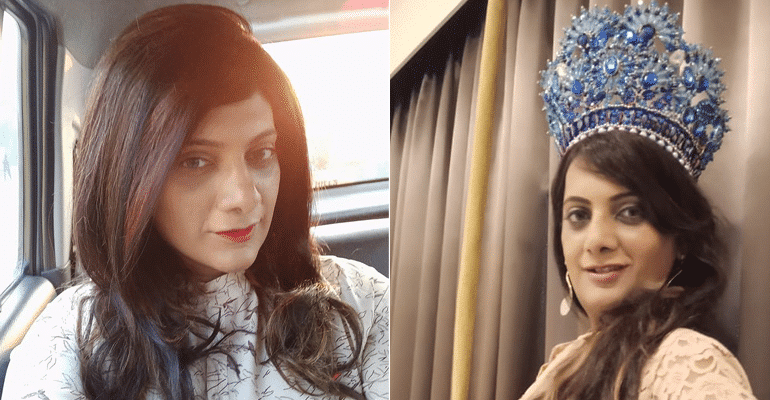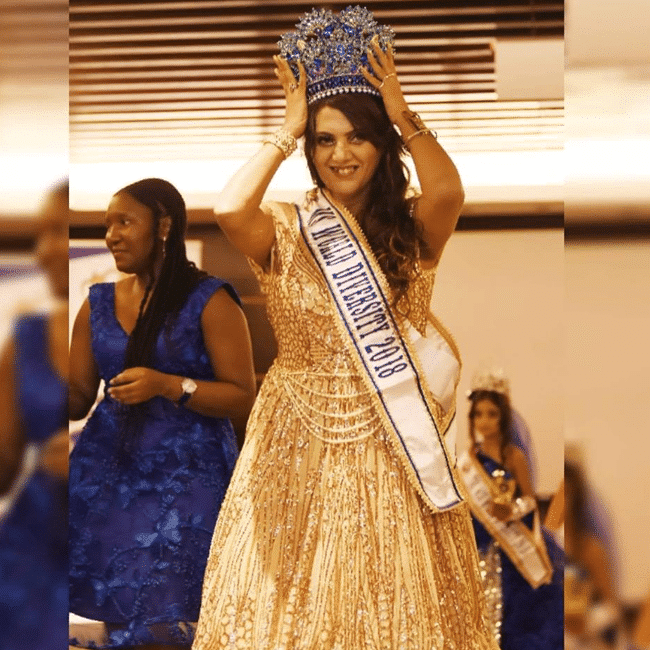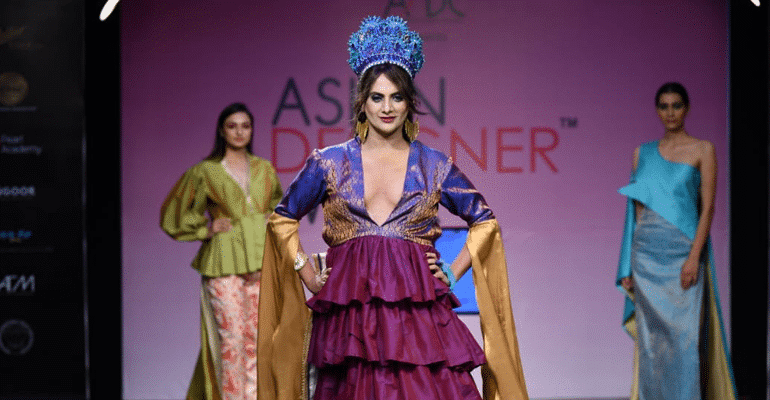Studying fashion designing, working with top designers of India like Ritu Kumar and Ritu Beri, and winning Miss World Diversity 2018 didn’t make her problems in life disappear.
“At the age of 6, I was sent to stay with my maternal uncle’s family in Mumbai because my parents were ashamed of my feminine nature. As fate would have it, my nephew used to sexually abuse me along with his friends when elders were not around,” says this 35-year-old transgender woman.

When you gift fear and shame to your child instead of love and compassion, they grow up haunted by grief. But, this woman chose to fight all odds, instead of giving up and wallowing in self-pity.
In a heartwarming conversation with Life Beyond Numbers, the first Indian transsexual Miss World Diversity, Aizya Naaz Joshi speaks about her childhood, facing rejection from society, winning a beauty pageant and hope to live a beautiful life surrounded by love and compassion.
Even though she was born to a Hindu-Muslim family, Naaz believes that humanity is her only religion.
A resident of Delhi’s Shahdara, Naaz always felt that she is a woman trapped in a man’s body. “I wanted to wear skirts as a child, but my feminine nature was always questioned and under scrutiny. People either abused me or bullied me for being myself,” says Naaz.
Memories enclosed with grief
Naaz was forcefully sent to Malad (in Mumbai) in 1986 and to support her education, she had to work at a roadside dhaba. “In the morning, I attended school and by afternoon, I washed dishes and served food there. That was my only escape since I got to wear skirts and dresses and I went to work as a girl.”
While she was working at the dhaba, Naaz came across a group of people belonging to the transgender community, but most of them turned out to be either beggar or were associated with sex-trade.
“Mental and sexual abuse is something I wanted to distance myself from all my life. I was neither safe at home or in the streets. Still, at the age of 11, I ran away and got in touch with a transwoman from kinnar (transgender) community who used to work at a dance bar,” recalls Naaz.
She worked there for 6 years so that she can fund her studies. “Working there helped me because I had a place to stay and food to eat. I was able to finish my schooling and was looking forward to new opportunities.”

A die-hard Sridevi fan, Naaz copied her dance moves while working at the dance bar and luckily someone from the fashion industry noticed and suggested her to join NIFT (National Institute of Fashion Technology).
No country for transgenders
Getting admission in NIFT wasn’t easy either because back then “third gender” was yet to be recognized by the Supreme Court of India and the only way to get admission there was if she identified herself as a male.
“It is very difficult to fight strict gender roles in college, work, pretty much wherever you go. I was asked to dress up like a man if I wanted to pursue the course. I agreed because I saw this as an opportunity to find employment in the fashion industry,” says Naaz.
To fund her course in NIFT she worked at Mc Donald’s and Dominos outlets in Delhi but later she joined a massage parlor to earn her daily bread. “I joined as a manager in that massage parlor, but later I was informed that I also have to be a masseur. Soon I realized, that they were running prostitution under the banner of a massage parlor but because it was my only source of income, I chose to stay there. ”
“Prostitution is the last option for any woman on this earth. I had to kill myself to do this, but I was out of options,” she says.
Even though she emerged as a topper at NIFT, her credentials always took a back seat because of her gender identity whenever she went to look for employment opportunities.
At the age of 21, she got the opportunity to work with labels like Ritu Kumar and Ritu Beri, but things didn’t pan out well there and she decided to part ways. During that time, she also pursued an MBA marketing from IMT (Ghaziabad) through correspondence, as she was denied a regular admission.
“Men used to call me names- chakka, mamu, hizra, people used to stare at me, laugh at me, made derogatory remarks. When it starts happening on a daily basis, it somehow makes you believe that there is no hope for people like us and that we don’t deserve to live a normal life. It strips you of your dignity as well,” says Naaz.
It was in 2013, Naaz chose gender reassignment surgery so that her body aligns with her feminine soul.
An Urdu word, ‘Naaz’ means ‘Pride’
“I take a lot of pride in just being myself. Like every other woman, I too dream of falling in love and have a beautiful life,” says Naaz.
She continues. “I did fall in love once, but when I had an accident and I asked my partner to take me to a nearby hospital, he denied to assist me saying it will be shameful if people found out we were together. I knew I had to come out of it.”

It was a great relief when NALSA judgment was passed on April 15, 2014, when transgender people were recognized as the “third gender” by the Supreme Court, she says.
She made headlines after Rishi Taneja, a photographer, made a biopic on her. But, even after that, the movie offers that crossed her path demanded sexual scenes only.
“Society has strict rules about who can be included in the society. This is something I have fought all my life.”
Apart from being a social activist, she tried her luck in modeling as well. Naaz fought for her dreams and stood strong when everything was falling apart in her life.
In 2012, Donald Trump, who owned Miss Universe pageant, changed the rules allowing transsexuals to participate in the Miss Universe beauty pageant. It was then, Naaz decided to try her luck in modeling.
Last year in 2018, she competed against 22 female contestants and went on to become the first Indian transsexual Miss World Diversity in Dubai. Not just that, she is also the first Indian transsexual woman to appear on the cover of a magazine and the world’s first woman to endorse a sanitary napkin, Klaren.
“When parents fail to accept their own children, society also finds a way to discard them. The physical appearance is just like an outfit, but the soul remains the same. No child deserves to grow up in shame and fear.”- a message she wants to send to people, particularly to parents who abandon their child because of their gender.
Over the years Naaz has taught herself to be happy, carefree and confident and she believes that employment is extremely crucial for people belonging to LGBTQ community and transgender inclusion in the workplaces will help people like her to live a life with dignity.

